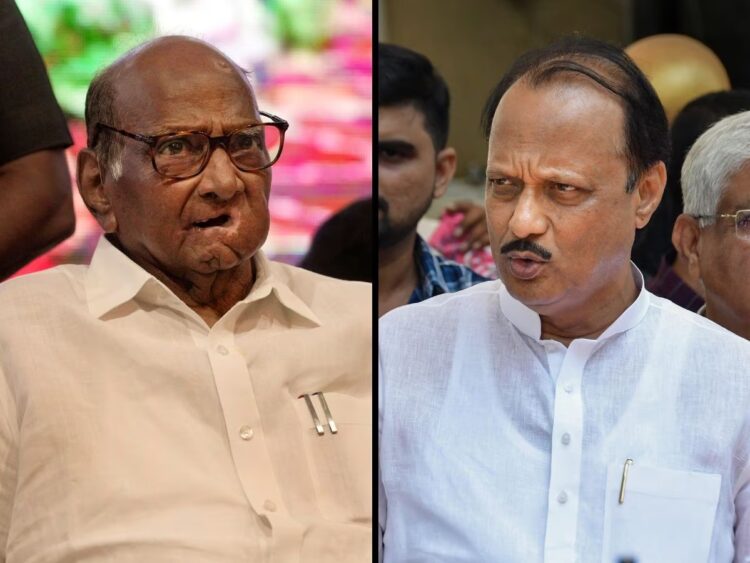In a significant development impacting the landscape of Maharashtra politics, the Election Commission adjudicated in favour of the faction led by Ajit Pawar in the longstanding dispute within the Nationalist Congress Party (NCP). This decision marks a major setback for the faction under the leadership of Sharad Pawar, a veteran politician in the region.
On Tuesday (February 6), the Election Commission announced its verdict, granting the name and symbol of the NCP to the faction headed by Ajit Pawar. This decision holds crucial implications for the upcoming elections, as it solidifies the position of Ajit Pawar’s faction within the party structure.
In its ruling, the Election Commission offered a concession to the Sharad Pawar faction, providing them with a one-time opportunity to name their new political formation and submit three preferences to the Commission. However, this option must be exercised by 3 pm on February 7, 2024.
The decision comes after a series of hearings spanning over six months, during which legal representatives from both factions presented their arguments before the Election Commission. Prominent lawyers such as Mukul Rohatgi, Neeraj Kishan Kaul, and Maninder Singh advocated for the petitioner, Ajit Pawar, while Abhishek Manu Singhvi and Devdatt Kamat represented the respondent, Sharad Pawar.
The Election Commission based its decision on several factors, including the aims and objectives outlined in the party constitution, the test of the party constitution, and the assessment of majority within the organisational and legislative wings of the NCP.
Crucially, the Commission found that both factions had operated outside the framework of the party constitution and organisational elections, thereby compromising internal party democracy. Furthermore, inconsistencies in the claims made by the Sharad Pawar faction regarding their organisational majority raised doubts about the reliability of their position.
Given the proximity of the decision to the upcoming elections to the six seats of the Rajya Sabha from Maharashtra, the Election Commission extended a special concession to the Sharad Pawar faction to comply with electoral rules. Additionally, the Commission invoked its powers under Para 18 of the Symbols Order to provide the Sharad Pawar faction with the opportunity to name their new political formation.
In its ruling, the Election Commission emphasised the importance of transparency in internal party affairs and urged political parties to adopt disclosure practices regarding organisational elections and internal democracy. The Commission suggested that political parties should consider voluntary public disclosures of party constitutions, electoral processes, and elected office bearers to ensure accountability and informed participation of the electorate.
This decision by the Election Commission not only resolves the internal dispute within the NCP but also sets a precedent for transparency and accountability in political party operations, potentially influencing electoral practices across the country.
In a dramatic turn of events in July of last year, Ajit Pawar, accompanied by 40 MLAs, defected from his uncle and NCP founder Sharad Pawar’s camp to align with the BJP-Sena government. This move sparked a contentious dispute over the true identity of the Nationalist Congress Party (NCP), with both factions vehemently asserting their legitimacy.
Just two days prior to his rebellion against Sharad Pawar, Ajit Pawar took his case to the Election Commission (EC), laying claim to the NCP’s name and symbol, and subsequently declaring himself as the party’s president.
The EC cited the “test of the legislative majority” as a pivotal factor in favouring Ajit Pawar’s faction and granting them control over the NCP symbol.
Highlighting significant discrepancies in the timelines presented by the Sharad Pawar group, the EC emphasised that these inconsistencies undermined the credibility of their assertion of organisational majority.
Reacting to the verdict, Ajit Pawar said, “We humbly accept the order of the Election Commission of India. The ECI has accepted the submissions made by our counsels and we thank the ECI.”




















Comments